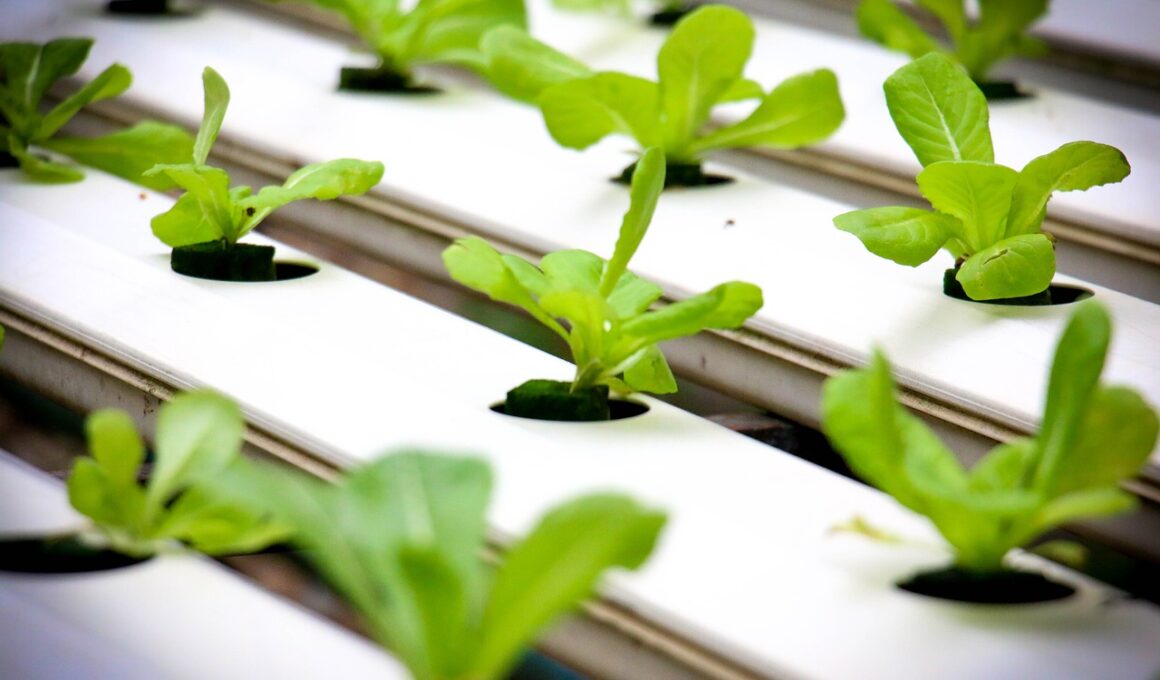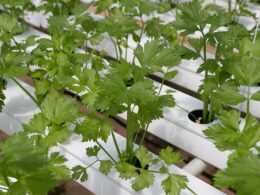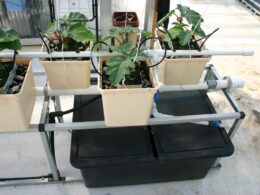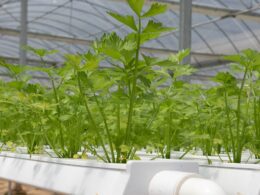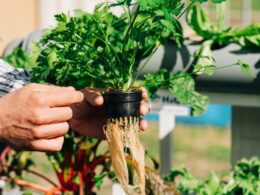Are you an avid gardener looking to give your plants a boost? You may have heard about the benefits of Epsom salt and its ability to promote growth and health in plants.
However, before you start sprinkling this mineral compound all over your garden, you should know that there is a risk of overusing it. Overusing Epsom salt in plants can lead to negative consequences, including stunted growth and even death.
It’s important to understand the right amount to use and how to use it safely and effectively. In this article, we’ll explore the benefits and risks of Epsom salt for plants and provide tips for using it in a way that promotes growth and health without harming your plants.
The Benefits of Epsom Salt for Plants
Get ready to witness a boost in your green babies’ growth and overall health – all thanks to the amazing benefits that Epsom salt offers! This compound is a natural and affordable way to help your plants thrive.
Epsom salt is made up of magnesium and sulfate, two essential nutrients that are crucial for plant growth. One of the benefits of Epsom salt for plants is that it helps improve soil quality. The magnesium in Epsom salt helps to loosen up compacted soil, making it easier for plants to grow their roots.
Additionally, Epsom salt can help improve nutrient absorption in plants, which leads to healthier and more vibrant foliage. Another benefit of using Epsom salt for plants is that it can help prevent common plant diseases. Magnesium plays a key role in strengthening plant cell walls, making it harder for diseases to take hold.
By using Epsom salt, you can help protect your plants from fungal infections and other diseases that can harm their growth and health. By now, you can see that Epsom salt has numerous benefits for your plants, from improving soil quality to preventing diseases.
When using Epsom salt, it’s important to follow the recommended usage guidelines and not overdo it. However, incorporating Epsom salt into your plant care routine can lead to healthier, more vibrant plants that will thrive for years to come.
The Risks of Overusing Epsom Salt
If you overuse Epsom salt in your plants, you may cause nutrient imbalances that could negatively impact their growth. It’s important to remember that while Epsom salt can be beneficial in moderation, too much can lead to toxicity in sensitive plants.
You should always follow the recommended guidelines for use to ensure the health and proper growth of your plants.
Nutrient Imbalances
When there is an imbalance of nutrients in the soil, it can lead to stunted growth and unhealthy plants. Overusing Epsom salt can cause a nutrient imbalance in your plants, which can be detrimental to their health.
Here are some common misconceptions about Epsom salt and prevention techniques to ensure your plants stay healthy:
-
Misconception #1: Epsom salt is a miracle cure for all plant problems.
-
Prevention Technique #1: Use Epsom salt sparingly and only when necessary. Conduct soil tests to determine which nutrients are lacking and if Epsom salt is needed.
-
Misconception #2: More Epsom salt equals better plant growth.
-
Prevention Technique #2: Follow the recommended dosage on the Epsom salt package and do not exceed it. Overusing Epsom salt can lead to toxic levels of magnesium in the soil and cause nutrient imbalances.
By understanding the risks of overusing Epsom salt and implementing prevention techniques, you can ensure your plants receive the necessary nutrients for healthy growth. Remember, a little bit of Epsom salt goes a long way.
Impact on Plant Growth
Using too much of Epsom salt can harm the growth of your beloved garden. While it’s true that this mineral compound can provide a variety of benefits to your plants, including improved nutrient uptake and increased yield, overusing it can have negative consequences.
When applied in excess, Epsom salt can cause a build-up of magnesium in the soil. This can lead to a nutrient imbalance that negatively impacts plant growth. The effects of overusing Epsom salt can be especially problematic for plants that are already struggling with nutrient imbalances.
In some cases, excessive use of this compound can even lead to stunted growth, decreased yield, and the death of your plants. Therefore, it’s important to use Epsom salt in moderation and to be mindful of the potential impact it may have on your garden’s overall health and growth.
Toxicity in Sensitive Plants
Sensitive plants can be negatively impacted by the toxicity of excessive magnesium from Epsom salt, so it’s important to be mindful of their needs and potential reactions.
While Epsom salt is generally safe for most plants, certain sensitive species can suffer from toxicity when exposed to high amounts of magnesium. Symptoms of toxicity include yellowing of leaves, stunted growth, and even death in severe cases.
In addition to its potential toxicity in sensitive plants, excessive use of Epsom salt can also have a negative environmental impact. When too much is used, the salt can accumulate in the soil and affect the balance of nutrients, leading to imbalances in the overall ecosystem.
It’s important to follow recommended usage guidelines and to be mindful of the needs of both plants and the environment when using Epsom salt in your garden.
How to Determine the Right Amount of Epsom Salt for Your Plants
When determining the right amount of Epsom salt for your plants, you should start by testing your soil to understand the nutrient composition.
Consulting with experts can also be helpful to ensure you’re using the correct amount and not causing harm to your plants.
In addition, following recommended guidelines can help you achieve the desired results without overusing Epsom salt.
Testing Your Soil
Testing your soil is an important step before adding any amendments. It can provide valuable information about the nutrients and pH levels necessary for healthy plant growth. Here are some steps you can take to test your soil:
-
Use a soil test kit to check the pH level of your soil. This will tell you if your soil is too acidic or alkaline for your plants to grow well.
-
Look for signs of nutrient deficiencies in your plants, such as yellowing leaves or stunted growth. This can help you identify which nutrients your soil may be lacking.
-
Dig a small hole in your garden and examine the soil. Is it sandy or clay-like? Is it dry or moist? This can help you determine how often to water your plants and whether you need to add organic matter to improve soil structure.
-
Consider sending a soil sample to a professional lab for analysis. This can give you a more detailed report of the nutrients and pH levels in your soil.
By taking the time to test your soil, you can ensure that you’re not overusing epsom salt or any other amendment. This can help you avoid damaging your plants and promote healthy growth.
Consulting with Experts
Consulting with experts can provide valuable insights and recommendations for achieving optimal plant growth in your soil. When it comes to using Epsom salt in plants, it’s important to seek experts’ advice to avoid common misconceptions and overuse. While Epsom salt can provide magnesium and sulfur to plants, too much of it can harm your plants and soil.
Experts can help you determine the appropriate amount of Epsom salt to use in your plants based on the soil type, plant species, and nutrient requirements. They can also advise you on the frequency of application and how to monitor the plant’s response to the treatment. Additionally, they can debunk common misconceptions about Epsom salt, such as its ability to cure all plant problems or its effectiveness in increasing plant growth. By seeking experts’ advice, you can ensure that your plants receive the right amount of nutrients without causing harm to the environment or your plants.
| Epsom Salt Misconceptions | Expert Advice |
|---|---|
| Epsom salt can cure all plant problems | Epsom salt is not a cure-all and should be used in moderation |
| Epsom salt can increase plant growth | Epsom salt can only provide magnesium and sulfur, which are essential for plant growth but not a guarantee for increased growth |
| Epsom salt is safe for any plant and soil type | Epsom salt should be used with caution and according to the specific needs of the plant and soil type |
| Epsom salt can replace other soil amendments | Epsom salt should be used in addition to other soil amendments and not as a replacement |
Remember, it’s always best to consult with experts before using any new treatment on your plants. This will ensure that you avoid overuse and achieve optimal plant growth in a safe and sustainable way.
Following Recommended Guidelines
Following recommended guidelines for using Epsom salt can lead to healthier and more vibrant gardens, allowing plants to thrive and reach their full potential. However, overusing Epsom salt can have severe consequences on your plants. Here are three reasons why following recommended application rates is crucial for the health of your garden:
-
Salt burn can manifest as brown, dry leaves, and stunted growth. It happens when the salt concentration in the soil becomes too high, causing the plant roots to dry up and die.
-
Too much magnesium can cause an imbalance in the soil’s nutrient levels, leading to nutrient deficiencies in other areas. This can cause your plants to suffer, even if they are getting enough magnesium.
-
Overusing Epsom salt can impact the environment negatively. When the excess salt leaches into the soil and groundwater, it can cause harm to animals, plants, and even humans.
Following recommended application rates ensures that you are using Epsom salt safely and sustainably.
Are Nutrients Necessary for Plants to Grow Hydroponically?
Are nutrients necessary for plants to grow hydroponically? The answer is no. Hydroponic systems allow for growing hydroponics without nutrients. It’s a common misconception that plants require soil or traditional fertilizers to thrive. With the right balance of water, light, and air, plants can flourish in nutrient-rich solutions. Hydroponics offers a nutrient-dense alternative for successful plant growth.
Tips for Using Epsom Salt Safely and Effectively
To get the most out of using Epsom salt in your garden, it’s important to know how to safely and effectively incorporate it into your routine.
Firstly, always follow the recommended guidelines and don’t overuse it. Epsom salt should only be used once a month to avoid buildup in the soil. Remember that using too much of it can harm your plants rather than help them.
Secondly, when using Epsom salt, it’s important to dissolve it in water before applying it to your plants. This prevents the salt from harming the roots and allows for better absorption. Use a ratio of one tablespoon of Epsom salt to one gallon of water for a safe and effective solution.
Lastly, be sure to apply Epsom salt to the right plants. It’s best suited for plants that have a higher magnesium requirement, such as tomatoes, peppers, and roses. Avoid using it on plants that don’t need it, as this can lead to over-fertilization and damage.
By following these tips, you can safely and effectively use Epsom salt in your garden to promote healthy plant growth.
Alternatives to Epsom Salt
When it comes to fertilizing your plants, there are alternatives to using Epsom salt. Other natural fertilizers such as compost, manure, and fish emulsion can provide nutrients to your plants.
Commercial fertilizers are also an option, but be sure to read the label and use as directed.
Additionally, soil amendments like peat moss and vermiculite can improve soil quality and help your plants thrive.
Other Natural Fertilizers
Hey, if you’re looking for some alternative natural fertilizers, check out compost, seaweed, or fish emulsion. These organic alternatives are just as effective as store-bought fertilizers and are great for those who prefer homemade fertilizers.
Compost is a great way to provide nutrients to your plants while also recycling food and yard waste. You can make your own compost by collecting food scraps, yard waste, and leaves in a compost bin. Once the materials have decomposed, you can use the resulting compost to fertilize your plants.
Seaweed is another natural fertilizer that can be found along the beach or purchased at a gardening store. It contains nutrients such as nitrogen, potassium, and phosphorus that are essential for plant growth.
Finally, fish emulsion is a type of fertilizer made from fish waste. It is high in nitrogen and can be used to promote leafy growth in plants.
Using natural fertilizers like compost, seaweed, and fish emulsion can be a safer and more sustainable option for your garden. By avoiding overuse of chemicals and sticking to natural alternatives, you can create a healthy and thriving garden ecosystem.
Commercial Fertilizers
Using commercial fertilizers may have negative impacts on the environment and your health, so it’s important to consider natural alternatives. Organic fertilizers are made from natural sources and don’t contain any harmful chemicals.
They provide the necessary nutrients for plants to grow and thrive, without causing harm to the environment or the people using them. Chemical fertilizers, on the other hand, are made from synthetic materials and can cause long-term effects on the soil and the plants.
They can also leach into groundwater and cause pollution. When using commercial fertilizers, it’s important to be aware of the long-term effects they can have on your plants and the environment.
Chemical fertilizers may provide a quick fix to nutrient deficiencies, but they can also cause harm in the long run. Organic fertilizers, on the other hand, may take longer to show results, but they provide a more sustainable and eco-friendly solution.
By choosing organic fertilizers, you’re not only helping your plants grow, but you’re also contributing to a healthier ecosystem. So, before reaching for a commercial fertilizer, consider the long-term effects and choose the organic option.
Soil Amendments
It’s important to consider natural alternatives for enriching your soil, and organic soil amendments provide a sustainable and eco-friendly solution.
One of the most popular soil amendments is Epsom salt, which is magnesium sulfate. It’s a great way to boost magnesium levels in the soil, which can help plants produce chlorophyll and grow stronger. However, it’s important to use Epsom salt in moderation, as it can also affect the soil pH and lead to nutrient deficiencies if overused.
Before adding Epsom salt to your soil, it’s important to test the soil pH and nutrient levels. If the soil is already high in magnesium, adding more through Epsom salt can lead to imbalances in other nutrients. Additionally, using too much Epsom salt can lower the pH of the soil, making it more acidic and affecting the availability of other nutrients.
So, while Epsom salt can be a great soil amendment, it’s important to use it in moderation and with caution to avoid any negative effects on plant growth.
Frequently Asked Questions
Can Epsom salt harm plants if used in small amounts?
If you’re considering using Epsom salt to aid in your plant growth, it’s important to understand the effects on soil and absorption rate. Epsom salt, also known as magnesium sulfate, can be a helpful supplement for many plants when used in small amounts.
However, overusing this mineral can actually harm your plants by changing the pH balance of the soil and reducing the absorption rate of other important nutrients. To ensure the health of your plants, it’s best to use Epsom salt sparingly and in conjunction with other fertilizers and supplements.
Keep in mind that more isn’t always better, and moderation is key when exploring Epsom salt usage in plant growth.
Does Epsom salt have any effect on the taste or quality of fruits and vegetables?
Epsom salt is a popular choice among gardeners looking to improve the health and nutrition of their plants. However, it’s important to be mindful of the potential drawbacks. When it comes to taste and quality of fruits and vegetables, there is limited research on the effects of Epsom salt.
It is possible that overuse of Epsom salt can lead to an imbalance of minerals in the soil, which may negatively impact the taste and quality of your produce. It’s important to use Epsom salt in moderation and to ensure that you are still providing your plants with a well-rounded and balanced diet.
Can Epsom salt be used on all types of plants, or are there specific ones it should not be used on?
When using Epsom salt on plants, it’s important to consider plant compatibility and Epsom salt dosage. Not all plants are suited for Epsom salt use, and applying too much can also be harmful.
Some plants that benefit from Epsom salt include tomatoes, peppers, and roses, while others like succulents and ferns may not tolerate it well.
As for dosage, a general rule of thumb is to use 1 tablespoon of Epsom salt per gallon of water, but it’s best to consult specific guidelines for each plant type.
Remember to always err on the side of caution to avoid any negative effects on your plants.
What are the environmental impacts of using Epsom salt in plants?
When it comes to using Epsom salt in your plants, it’s important to consider the ecological impacts.
While Epsom salt can improve soil fertility by providing essential nutrients like magnesium and sulfur, overuse can harm the environment.
The excess nutrients can leach into nearby water sources, leading to algal blooms and other water quality issues.
It’s essential to follow recommended application rates and use Epsom salt sparingly to minimize any negative impacts on the environment.
By practicing responsible use, you can still enjoy the benefits of Epsom salt without harming the planet.
Are there any specific precautions to take when using Epsom salt in indoor plants?
When it comes to using Epsom salt on your indoor plants, it’s important to follow proper dosage and application methods. Too much of anything can be harmful, even natural remedies like Epsom salt.
Before applying, make sure to read the instructions carefully and measure out the appropriate amount for your plant. Additionally, it’s important to take precautionary measures, such as wearing gloves and keeping the salt away from pets and children.
By following these guidelines, you can safely and effectively use Epsom salt on your houseplants to promote healthy growth and development.
Conclusion
So, can you overuse Epsom salt in plants? The answer is yes.
While Epsom salt can provide many benefits to your plants, too much of it can lead to negative consequences such as dehydration and even death. It’s important to determine the right amount of Epsom salt for your specific plant and to use it safely and effectively.
Remember, Epsom salt is not a cure-all solution for your plants. It’s important to also consider other factors such as proper watering and fertilization.
If used correctly, Epsom salt can be a valuable tool in promoting the health and growth of your plants. Just be sure to use it in moderation and always follow safe and effective practices.





